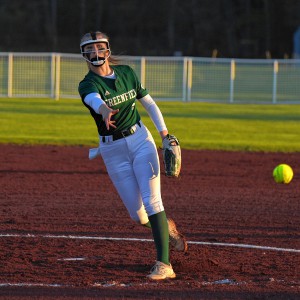Judge allows abutter to conduct wetlands review in Deerfield park project
| Published: 01-09-2023 9:53 PM |
SOUTH DEERFIELD — A Franklin County Superior Court judge has ruled that a resident appealing the town’s North Main Street park project can conduct an independent review of the property’s wetlands, as an appeal of the project continues.
In a decision filed on Jan. 3, Judge Karen Goodwin ruled that Judith Rathbone, an abutter of the proposed park at 135 North Main St., and her retained experts may enter the property to conduct non-damaging soil testing to determine if there are any additional wetlands on the site.
The town and its lawyers argued that allowing Rathbone to enter the site was a “slippery slope” because her appeal is about the site plan review, but Goodwin said the plaintiff has a right to pursue discovery because the town has “not shown any undue burden.”
“Although the plaintiff faces an uphill battle in expanding the definition of wetlands under the zoning bylaws beyond areas designated by the Conservation Commission, she should be permitted to pursue discovery,” Goodwin wrote. “The fact that the defendants may wish to engage an expert to counter any findings by the plaintiff’s expert does not provide a basis for denying the plaintiff permission to conduct soil testing.”
Attorney John McLaughlin, who is representing Rathbone, said his client’s experts “suspect there’s more wetlands there than there were delineated” by the Deerfield Conservation Commission in September 2020.
“They wouldn’t let us on the property during the site plan review hearings, but my experts could walk on my client’s property and look over and they knew the hydrology of her property,” McLaughlin said in a phone call, reemphasizing points he made in a supplemental memorandum filed in court. “They still suspect there’s more wetlands there, but they can’t definitely say there are or aren’t if they can’t get onto the property.”
Additionally, McLaughlin said the Determination of Applicability, or the Conservation Commission’s confirmation of wetlands, is valid for three years after it is issued. The determination, according to McLaughlin’s court documents, expires on Sept. 17 of this year and a trial on the appeal is set for Sept. 18, which he said will “complicate the court’s decision.”
“Whether there are other or additional wetlands on the subject property is relevant to those claims and will be even more relevant when the (Determination of Applicability) expires,” McLaughlin wrote. “The Court and the parties should at least know whether there are more wetlands on the subject property then were delineated in 2020 and where those additional wetlands are located.”
Article continues after...
Yesterday's Most Read Articles
 Retired police officer, veteran opens firearms training academy in Millers Falls
Retired police officer, veteran opens firearms training academy in Millers Falls
 UMass graduation speaker Colson Whitehead pulls out over quashed campus protest
UMass graduation speaker Colson Whitehead pulls out over quashed campus protest
 As I See It: Between Israel and Palestine: Which side should we be on, and why?
As I See It: Between Israel and Palestine: Which side should we be on, and why?
 Real Estate Transactions: May 10, 2024
Real Estate Transactions: May 10, 2024
 Baseball: Caleb Thomas pitches Greenfield to first win over Frontier since 2019 (PHOTOS)
Baseball: Caleb Thomas pitches Greenfield to first win over Frontier since 2019 (PHOTOS)
 High Schools: Greenfield softball squeaks out 1-0 win over Franklin Tech in pitchers duel between Paulin, Gilbert
High Schools: Greenfield softball squeaks out 1-0 win over Franklin Tech in pitchers duel between Paulin, Gilbert
The town, however, argued that “all parties agree, and it is uncontested, that the 2020 delineation of the wetlands on the property was valid, unappealed and in force at the time of the Deerfield Planning Board hearings on the project at issue here and that it is valid and in force as of today.”
Deerfield attorney James Martin argued the Determination of Applicability is “clearly extendable” and Rathbone is “plainly attempting to circumvent the limits of discovery, and obtain an unfair advantage in collateral proceedings.”
“The potential future expiration of a delineation cannot alter whether the Planning Board’s decision was correct on the facts as they existed at the time,” Martin wrote in the defendants’ supplemental memorandum. “Even if a future lapse of a delineation was relevant (which it is not), such lapse is entirely hypothetical; and courts are generally disinclined to adjudicate hypothetical controversies.”
In her ruling allowing Rathbone and her experts to conduct testing, however, Goodwin wrote the definition of discovery is construed to “broadly encompass any matter that bears on, or that reasonably could lead to other matter that could bear on, any issue that is or may be in the case.”
With approval to enter the property for the sake of testing, McLaughlin said they will have to wait until the spring because testing is “partially based on vegetation.” Any testing, he added, will be unobtrusive and will not cost the town anything.
“It’s not going to hurt the property; it’s going to take one day and my client is paying for the experts,” McLaughlin said, noting more clarity on the property’s wetlands will come to light in May. “That’s the hope, that by the beginning of May we’ll know whether the 2020 Conservation Commission was right.”
Chris Larabee can be reached at clarabee@recorder.com or 413-930-4081.

 New USDA offices in Greenfield to aid staffing increase, program expansion
New USDA offices in Greenfield to aid staffing increase, program expansion Montague Notebook: May 10, 2024
Montague Notebook: May 10, 2024 Deerfield’s Tilton Library expansion ‘takes a village’
Deerfield’s Tilton Library expansion ‘takes a village’
